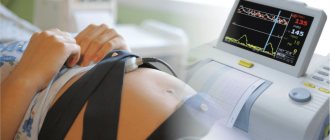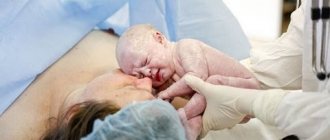Everyone knows that after childbirth, reproductive function is not restored immediately. This is why many women believe that breastfeeding is the right time for unprotected sex. But actually it is not. How likely is it to get pregnant during this period and what can be done to prevent this from happening?
- 2 Why you can get pregnant during lactation
- 3 In what cases is pregnancy unlikely while breastfeeding?
- 4 Methods of contraception for a nursing mother
- 5 Signs of pregnancy while breastfeeding
- 6 Table: pros and cons of breastfeeding during pregnancy
6.1 Video: feeding during pregnancy and tandem
What happens in a woman’s body during lactation
Doctors often call the time after childbirth lactational amenorrhea. During the period when a woman is breastfeeding (about 6 months after the baby is born), the hormone prolactin is actively produced in her body. It is responsible for the production of breast milk and more. It is under the influence of prolactin that the maturation of follicles is blocked. A woman does not ovulate, her periods do not occur, that is, the reproductive function essentially does not work . It is this phenomenon that is natural contraception during breastfeeding.
Prolactin, produced during lactation, blocks ovulation
Why can you get pregnant during lactation?
Lactational amenorrhea does not protect against pregnancy 100%. It happens that conception still occurs. A woman's menstrual cycle is restored gradually; for some women, periods appear within a few months after childbirth, while for others, only after a year, and this is absolutely normal . The duration of lactational amenorrhea is also influenced by the quality of breastfeeding: if the mother exclusively breastfeeds the child, without formula, then the amenorrhea will last quite a long time.
According to statistics, unplanned pregnancy during lactation occurs in 2-3% of women.
But it is impossible to predict when a woman’s hormonal background will begin to change and fertility will be restored. First, follicle maturation and ovulation will occur in the expectant mother’s body, and only then (after 14–16 days) menstruation will begin, that is, the woman simply will not notice the restoration of the cycle at first. If unprotected sexual intercourse occurs at this time, it is quite possible that the woman will become pregnant.
The neighbor began to stir. I went to the doctor complaining of frequent rumbling in my stomach. They sent me for an ultrasound. And there are already 17 weeks. She breastfed her youngest and became pregnant.
Anna Kichko
https://deti.mail.ru/forum/v_ozhidanii_chuda/beremennost/beremennost_vo_vremja_grudnogo_kormlenija/

The chance of getting pregnant during lactation is 2–3%
Features of female physiology
Indeed, the most common misconception of many women is that they do not imagine it is possible to conceive a child during the absence of menstruation. When fertilization occurs, the process of preparation for lactation is activated in the body of the expectant mother. The hormone prolactin, which is produced during this period, suppresses ovulation. For this reason, a woman stops menstruating.
Ovulation is the release of a mature egg from the ovary into the uterine cavity. If there is no ovulation process, there is no egg. Consequently, conception cannot occur, since there is nothing to fertilize. After childbirth, the concentration of prolactin depends on compliance with the feeding regimen and its duration. Breastfeeding will have a contraceptive effect if certain rules are followed. The baby must be put to the breast on demand, which is at least 8 times a day. Feeding should be carried out with breaks, the duration of which is 3-5 hours, no more. You cannot introduce complementary foods into your baby’s diet, and even more so, completely replace mother’s milk with artificial nutrition.
Even if these requirements are fully met, when a woman’s ovulation and cycle are restored, this method of contraception will no longer be effective. But determining this moment is quite problematic. Every woman's body is unique. When breastfeeding, ovulation can occur at 8 weeks after birth, and if the mother does not breastfeed, at 4 weeks. In some cases, menstruation may still be absent at this time, but ovulation will still occur. Therefore, after the birth of a baby, regardless of the presence of menstruation, you need to use contraception.
The opposite situation is also possible: the cycle can be restored without ovulation. The likelihood of a second pregnancy after childbirth is also determined by the fact that the activity of sperm entering the vagina continues for several days. And since it is impossible to foresee the moment of restoration of the cycle, fertilization can occur even in the absence of menstruation.
It should be noted that the onset of a new pregnancy after childbirth had its own characteristics at different times. In the old days, several generations ago, there was no ovulation during breastfeeding. Today, these two processes are increasingly observed to occur simultaneously. The main reason for this is the use of stimulant drugs during labor, which provokes changes in hormonal levels.
The duration of labor without stimulation is about 24 hours. Now such an expectation is not justified. In a significant number of women, pregnancy proceeds with various abnormalities from the very beginning. There is also a hormonal imbalance. For these reasons, stimulation is used during the birth process.
It is not uncommon for the cervix to open ahead of schedule. In this situation, the child must be removed as soon as possible. The prolonged process of dilatation is also dangerous, so special means are used to stimulate labor. These drugs are hormonal. As a result of their influence, the balance of hormones in a woman’s body is disrupted. This does not have negative consequences for health, but the likelihood of conception increases. As a result, pregnancy may occur 3 months after birth.
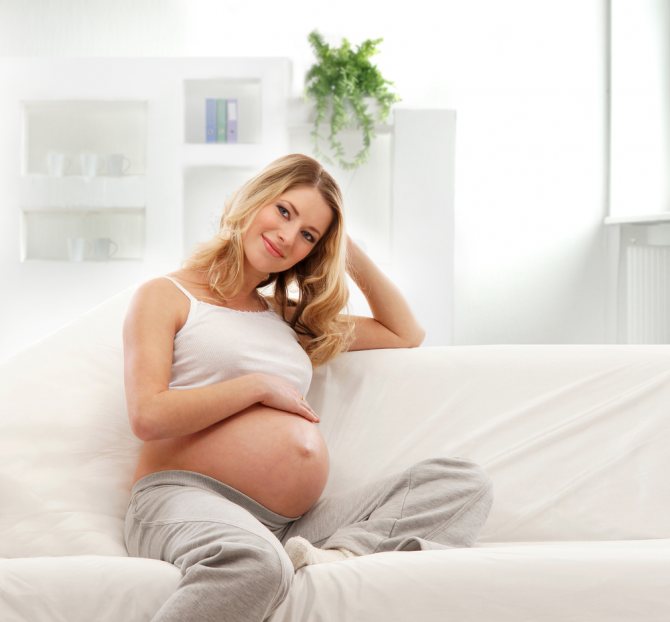
In what cases is pregnancy unlikely while breastfeeding?
There are several conditions that, when met, will help reduce the risk of pregnancy:
- Do not follow a feeding schedule, but give milk when the baby wants it. In addition, you should not take your baby’s breasts away - let him eat as much as he wants;
- Feed your baby at least once every 2 hours during the day and at least once every 3-4 hours at night. The more often you put your baby to your breast, the more active the production of prolactin occurs, which means the likelihood of pregnancy is lower;
- up to six months, feed your baby only breast milk, exclude formula milk and complementary foods;
- try to keep lactation regular, do not allow breaks;
- Feed your baby immediately after he is born, while still in the delivery room.
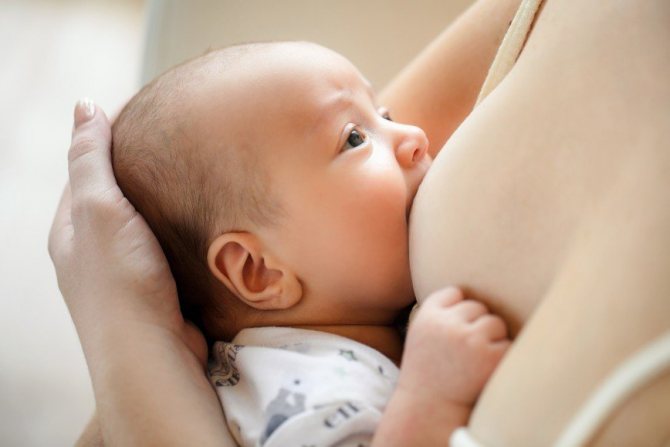
If you put your baby to your breast frequently, your chance of getting pregnant is lower.
Probability of pregnancy after childbirth
The pattern of re-conception after childbirth has not yet been identified by either scientists or medical practitioners. It is known that breastfeeding suppresses ovulation processes, but it is impossible to predict at what point a new cell will begin to form. The timing is extremely individual. Even based on the example of one woman, it is impossible to predict when pregnancy will occur after childbirth.
Important. The only instruction is to use a special test so as not to miss the first ovulation, and monitor menstruation.
Without lactation
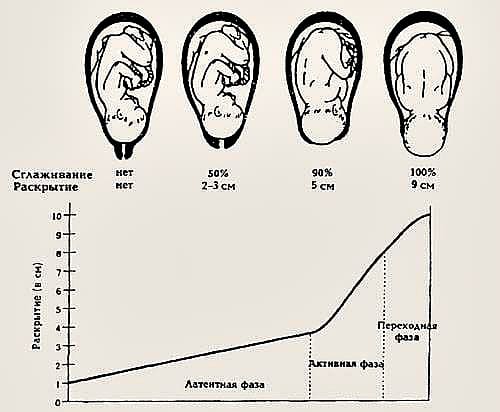
When a baby is mixed or bottle-fed, the chances of getting pregnant a second time increase dramatically. The hormone prolactin, which inhibits ovulation, is released exclusively during milk feeding. If the child eats baby formula and the number of breastfeedings is less than 7 times a day, then menstruation is restored within 4 weeks.
When feeding
The idea that a woman who breastfeeds does not get pregnant is a myth. The assumption is based on the characteristics of the postpartum period, when prolactin is produced in the mother's body. The hormone is responsible for stimulating the secretion of the mammary glands. A high amount of prolactin does not leave a chance for the resumption of menstruation. This phenomenon is “lactation amenorrhea.” However, married couples should not rely on this process as an effective method of contraception.
Sometimes a woman believes that the absence of a menstrual cycle is a consequence of breastfeeding, but it turns out that the new mother is pregnant again.
You can conceive a baby even during ovulation before the arrival of your first menstruation.
If a woman in labor decides to use lactation as a natural contraceptive, then the following instructions must be followed:
- when feeding, attach the baby exclusively to the mammary glands, and not to a bottle with expressed milk;
- feedings should be regular, and the breaks between them should be short (no more than 3-4 hours);
- Do not replace breast milk with artificial formulas.
If you do not follow these rules, menstruation may begin before three months.
With menstruation

When the menstrual cycle begins, the chances of conceiving again increase. However, the appearance of menstruation does not always guarantee the resumption of ovulation, although the onset of pregnancy depends on it.
The first menstruation after childbirth is more likely to be anovulatory (characterized by the absence of ovulation). If the discharge is scanty and only smeared for two days, then the egg has not been released.
Without periods
Since ovulation is possible before the onset of menstruation, pregnancy during this period is quite possible. Each female body is individual, and recovery of the cycle in the postpartum period occurs in different ways.
Contraceptive methods for nursing mothers
Despite the fact that the chance of becoming pregnant during lactational amenorrhea is quite small, it is still necessary to protect yourself. A nursing mother can choose the following contraceptive methods:
- condoms and vaginal diaphragm. These methods belong to barrier contraception; they do not have any effect on the female body, therefore they are completely safe for nursing mothers. It is recommended to use a lubricant along with a condom, since natural lubrication may not be enough in the first months after childbirth;
- spermicides. The effectiveness of spermicidal suppositories, creams and tablets is about 80%, but for a woman whose cycle has just begun to recover, this should be enough. The use of this method of contraception will not affect the quality of breast milk in any way. You can also use spermicides with barrier contraceptives to increase effectiveness;
- intrauterine device. It can be placed as early as six to eight weeks after birth, and the doctor will do this without any problems, because the cervix is still slightly dilated. The spiral will protect you from unwanted pregnancy for 3–5 years;
- mini-pill. These tablets contain the hormone progestin and do not contain estradiol. They do not affect the quality of milk in any way and are safe for a nursing mother. You can start taking it 2 months after birth, without waiting for the cycle to recover. But a doctor should select the pills; you should not prescribe medications yourself.
Combined oral contraceptives are allowed only six months after birth. The fact is that they slightly reduce milk production. At first this is undesirable, but at the age of 6 months the baby is already receiving complementary foods, so he no longer needs so much milk. Your doctor should prescribe a COC for you.
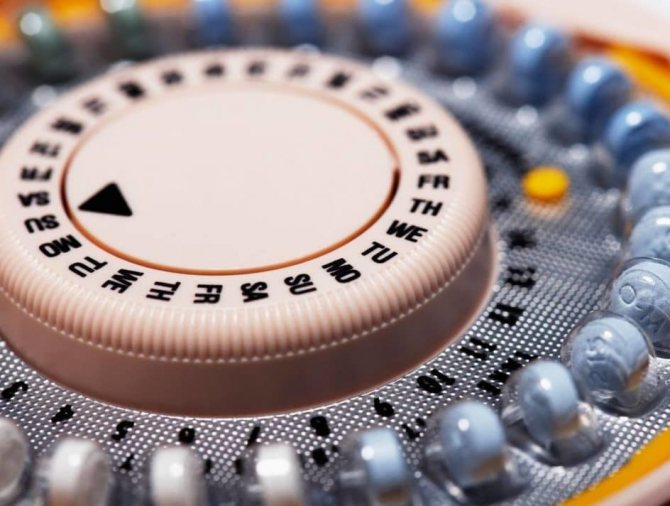
2 months after giving birth, a woman can begin to protect herself with mini-pills, but COCs are prohibited at first
Breastfeeding is not an obstacle to a new pregnancy
Many women know that if they breastfeed their baby, the body itself suppresses the occurrence of ovulation, and pregnancy does not occur. But this method, called lactational amenorrhea, can only work if the young mother strictly adheres to certain rules. A woman needs to feed her baby every three hours, including at night. This method of contraception can be effective only in the first six months after the baby is born and only if the young mother has not resumed her menstrual cycle.
Gynecologists claim that this method of contraception is reliable, but with a caveat: all rules must be followed strictly and without omissions. Therefore, new mothers often do not want to use this type of contraception, explaining that they need to worry and worry all the time whether she has breastfed the baby enough times, whether she did everything right.
Therefore, you should take a responsible approach to your sex life after childbirth. Gynecologists say that you can start having a sexual life again no earlier than 4-8 weeks after giving birth, depending on how exactly the process of giving birth to the child took place. In addition, a woman needs to undergo an examination, and only after the doctor gives the go-ahead and selects an effective method of contraception, begin to have sex. It is this approach to the situation that will be correct and rational and will allow you to avoid an unplanned pregnancy after childbirth.
Signs of pregnancy while breastfeeding
During breastfeeding, the menstrual cycle has not yet been restored, so conception cannot be recognized by the most obvious sign - delayed menstruation. But you can guess the presence of pregnancy by the following signs:
- changes in the quality of milk, which can also affect the child’s behavior;
- decreased milk supply;
- the presence of toxicosis;
- indigestion;
- development of colds;
- increased vaginal discharge;
- chest pain and nipple soreness. If at the same time you can feel lumps in your breasts, then be sure to consult a doctor - this indicates stagnation of milk.
There hasn't been a cycle yet. The pregnancy was discovered in the sixth month by kicks. Compared to the first one, I felt like heaven and earth, simply magnificent. After stopping feeding (the last 3 months of 2 pregnancies), milk stubbornly did not give up.
Flynx
https://deti.mail.ru/forum/v_ozhidanii_chuda/beremennost/beremennost_vo_vremja_grudnogo_kormlenija/

Toxicosis, indigestion - signs of pregnancy while breastfeeding
Table: pros and cons of breastfeeding during pregnancy
| pros | Minuses |
| Due to pregnancy, a woman will feel tired more often, and feeding time is the very period when you can just lie down and relax | A pregnant mother who is breastfeeding will be more tired, and it will not be easy to work with a small child. |
| If you continue to breastfeed mid-pregnancy, self-weaning may occur and the mother will not have to deal with weaning issues herself. | In the second trimester of pregnancy, the quality of milk will deteriorate and it will resemble colostrum more. |
| Tandem feeding (when a mother breastfeeds both an older and a younger child) will improve the relationship between babies and reduce jealousy | The absence of the mother during childbirth will be difficult for the older child, especially if he is not weaned |
Video: feeding during pregnancy and tandem
A good friend of mine fed her eldest while she was pregnant. Moreover, when the milk became not milk but colostrum (many children at this time give up breastfeeding on their own), the girl continued to suckle (at 2 years old).
Elena76
https://www.komarovskiy.net/forum/viewtopic.php?t=3289


